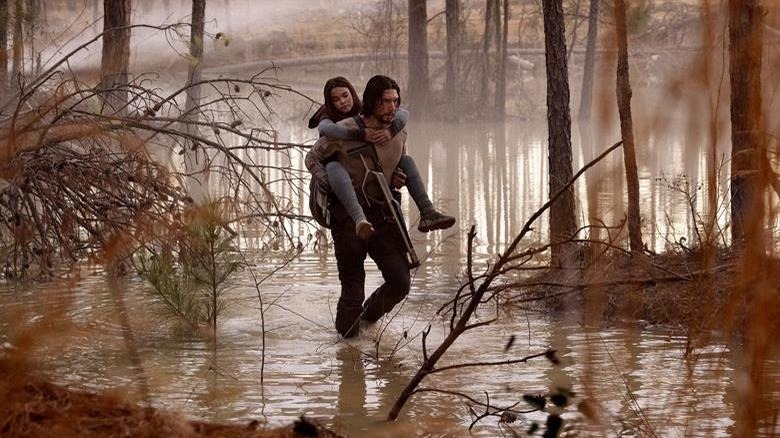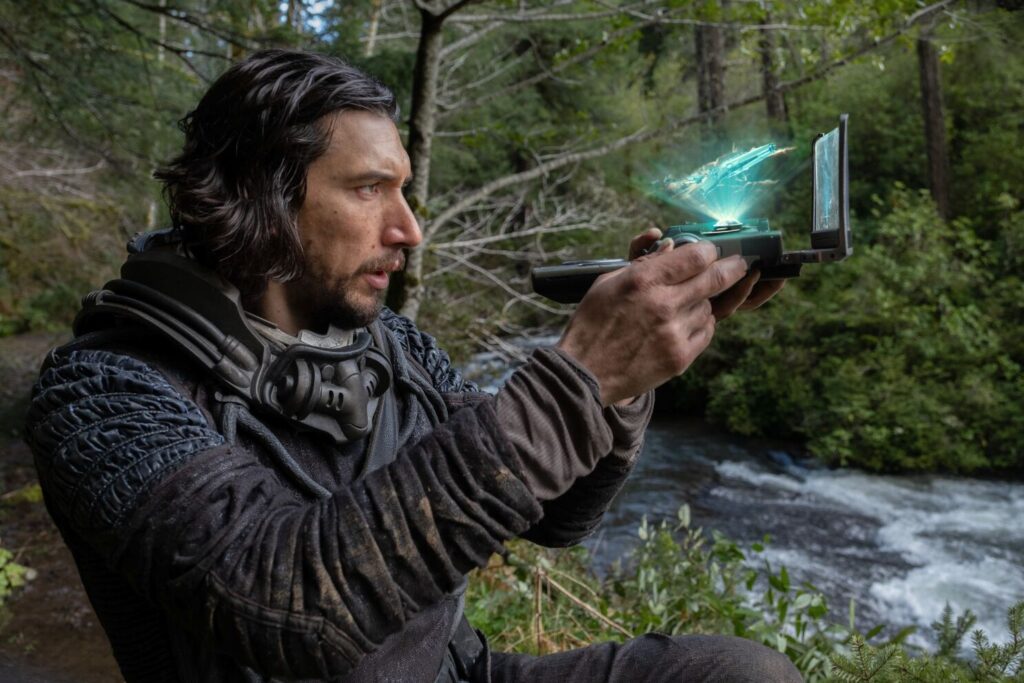Genre: Sci-Fi
Premise: An interplanetary explorer and a little girl crash land on earth 65 million years ago and must make it to their escape ship while avoiding the most dangerous predators the planet has ever known.
About: 65 inched its way towards a 13 million dollar opening this weekend, landing in third place behind Scream 7 and Creed 3. The subpar showing means we’ll probably never get the sequel, 66. Although, now that I think about it, that probably wouldn’t be a very good movie. Movie Trailer Voice Guy: “In a worrrllld consumed by fire and ash, where not a single living thing is still alive, one microbe is determined to replicate… in an attempt to repopulate the planet.” Yeah, probably won’t be at that one opening day. 65 was written by Scott Beck and Bryan Woods, who burst onto the scene several years ago with their breakout screenplay, A Quiet Place. This is their directing debut. The two first-timers had only 40 days to shoot the movie! For reference, Jurassic World had 115 days.
Writers: Scott Beck and Bryan Woods
Details: 93 minutes
 Is there anyone who looks more like a movie star today than Adam Driver?
Is there anyone who looks more like a movie star today than Adam Driver?
You may be thinking I’m covering the third biggest story today (Scream 7 and The Oscars being 1 & 2) but everything about this project, this screenplay, this movie, is infinitely more interesting to me than Scream or the Oscars.
Scott Beck and Bryan Woods wrote the spec script, A Quiet Place, five years ago. How cool is it that the script you’re working on RIGHT NOW could be the next Quiet Place. And how cool is it that several years later you could be directing a movie with freaking dinosaurs in it?? I just think that’s the awesomest thing in the world. It definitively shows you the power of a great script.
If I were still writing screenplays, this is the type of script I would write. A huge concept with a simple story – the kind of thing that works both on the page and in the theater. At least, theoretically. Maybe I’m about to learn my latest screenwriting lesson after watching “65.”
65 follows an interplanetary explorer (from another planet – not earth) named Mills. Mills is dealing with a daughter who grows very ill and then dies. But work calls so he has to get out there and keep sussing out the universe.
Halfway through his latest trip, an undocumented meteor cluster hits the ship and he crash-lands on earth…. 65 million years ago. Everyone in the cryo-bays is dead except for a 10 year old girl named Koa. Unfortunately, Koa speaks another language, so her and Mills can’t understand each other.
Mills realizes that when their ship broke up, the escape pod landed about 10 miles away on the side of a hill. And it’s still in tact. So if they can get to that, they can pop back up into space and wait for a rescue vessel.
But it’s not going to be an easy trip. Cause it’s 65 million years ago when dinosaurs were at their hungriest. Right away, Mills is attacked by a little baby runt lizard thing that’s as big as a large dog. He barely survives. And that’s one of the weakest animals he’ll to have to deal with!
As they traverse the jungle and try and communicate with each other (poorly), Koa spots something in the sky casually zipping past the moon. (Spoiler) Later, Mills sees it too, and we’re introduced to the coolest plot development in the movie – that the anomaly is the meteor that wipes out the dinosaurs. Yes, our duo happened to arrive on earth just hours before the most devastating moment in the planet’s history. Talk about bad timing.
Now, getting to the escape pod takes on significantly more importance. But, along the way, our duo gets the attention of a couple of T-Rexes. Unknown to Mills, the T-Rexes stalk them from a distance to the escape pod where they perform an all-out attack on our heroes, determined to keep them here and make them suffer the same fate as them.

Probably the hardest thing to do in a script like this is come up with two characters who we actually care enough about that we want to spend an entire 100 minutes with them.
Beck and Woods do all the right *technical* things in this screenplay. They give Mills a traumatic backstory where his daughter died of an illness. That’s what we’re told to do as screenwriters. If we want to build sympathy towards our protagonist, create a sympathetic situation for them. What’s more sympathetic than a parent losing a child?
Then you have the girl. This is a helpless little girl who’s scared and who only cares about getting back to her family. Who’s more sympathetic than a helpless scared girl?
Beck and Woods also incorporate a screenwriting tip I routinely encourage, which is to make things difficult for your characters. You never want anything to be easy for them. So B&W make it so Koa speaks another language. This creates a language barrier. Now it’s difficult for Mills and Koa to communicate even basic things, which makes their task of working together that much more difficult.
So far, no mistakes have been made in this screenplay.
Then you have the most ruthless landscape in history. Literally every inch of the 10 miles you’re going to traverse has potential danger within it. This creates tons of tension and suspense, which is exactly what you want in a movie like this.
Finally, Beck and Woods create one of the coolest ticking time bombs I’ve ever seen in a movie: THE meteor that killed the dinosaurs. I had a huge smile on my face when that plot point was introduced. And I gave the writers extra credit because they combo’d the inciting incident (the crash) with that meteor’s orbiting rocks, setting up the meteor from the get go. This makes the meteor’s arrival feel believable as opposed to forced.
All that should add up to a great movie, right?
Yes.
But it didn’t.
Why?
I had to sit with this one for a while because I didn’t know the answer to that question right away.
All I know is that the movie had some cool moments for sure. But I wasn’t engaged the way I wanted to be. Something was missing. And I tried to figure out what it was.
The first thing you look at is the main characters. There is an enormous importance to the audience liking the characters in scripts like this because there are only two of them. There aren’t any other characters to cut to. So if we don’t love the main protagonist, and love the co-protagonist, as well as love both of them together, nothing else matters. Doesn’t matter if you have sixty gazillion dinosaurs. We’re going to be bored.
One of the mistakes Beck and Woods made was DKB. DKB (Dead Kid Backstory) is a cancer upon screenplays. It is the single laziest attempt to create sympathy the screenwriter has access to and, therefore, often creates the opposite effect of what the writer is going for. Especially if you do what Beck and Woods did here, which was to endlessly repeat DKB. We must have seen Mills’s dead kid a thousand times throughout the movie (in videos and flashbacks) despite the fact that she’s dead!
Dead Kid Backstory can work if the movie doesn’t depend on it. Gravity is a good example. We never once see Sandra Bullock’s dead kid. But that backstory was enough to motivate the character (in that she wanted to get away from earth) and that’s all we needed. I suppose there are a handful of examples of DKB working but that’s a handful out of thousands of attempts. It’s just lazy.

The other big mistake they made was having Koa speak a different language. I think I know why Beck and Woods did this. A lot of these adult-kid team-ups inadvertently descend into the kid being the “adult in the room.” They’re smart. They’re precocious. And it just ends up feeling false, with the kid snapping back at our hero in ways that would never happen in reality. By creating this language barrier, there was no way the script would fall into this trap.
But in a movie with just two characters and those characters can’t have any real conversations? You’re playing with fire. That’s a long time to ask the audience to spend with characters without a single extended conversation. People get restless. Even in Beck and Woods semi silent film, A Quiet Place, there were full conversations that were had.
This is where writers can sometimes get ahead of their skis. They want to make some profound silent film. But silent films are freaking hard to pull off. Audiences don’t have the patience – especially these days – unless you execute a perfect 10 on the dive. Mixing metaphors here – roll with me.
The thing that ultimately did the script in was there wasn’t enough variety. This is a challenge you’re always going to run into in a script like this. 90% of the scenes are walking through a forest with dinosaurs peeking around the corner. You need to find ways to mix it up. And the ways they mixed it up didn’t work. For example, they tired to have a cave scene. But it was sloppily constructed and not very clear. “Mixing it up” only works when the mixed up part is good. Duh but, yeah, that’s the reality.
Oh, and one other thing that hurt 65 was that a concept like this necessities a large scope. There’s a natural let down when that scope isn’t met. The reason a movie like Palm Trees and Power Lines, which also revolves around two characters, works, is because the expectations of the concept are low. It’s two people stuck in a small town. 65, however, is overwhelmed by its gigantic premise, which eventually swallows it up. The audience wants more than the movie can give them.
I’m bummed out. Because the movie wasn’t bad. It just wasn’t as good as I wanted it to be. And I’m going to cheat here with the rating because while there is no way this movie is worth the 20 bucks it costs to see in a theater, I do think it’s a strong streaming choice where the expectations are lower. And I have to support spec scripts and original material. We need more shots like this or else we’re going to be stuck with “The Creed Universe.” Dear lord help us all.
[ ] What the hell did I just watch?
[ ] wasn’t for me
[x] worth the stream
[ ] impressive
[ ] genius
What I learned: There is no other artistic medium that thrives in the present better than the movie. Movies are the most alive when they’re focusing on the RIGHT NOW. Therefore, when you put too much emphasis on things that happened in the past, you move away from what makes a movie work. That’s not to say you should never include the past in your scripts. The past informs who your characters are in the present. But if you’re going to go down that road, know that you are purposefully moving away from what makes a movie work. Therefore, you better have a great reason for it.
What I learned 2: One way to fend off repetitive storylines is to add more twists than the average screenplay. Add more shocking moments. 65 could’ve benefited from a couple more of those for sure.

